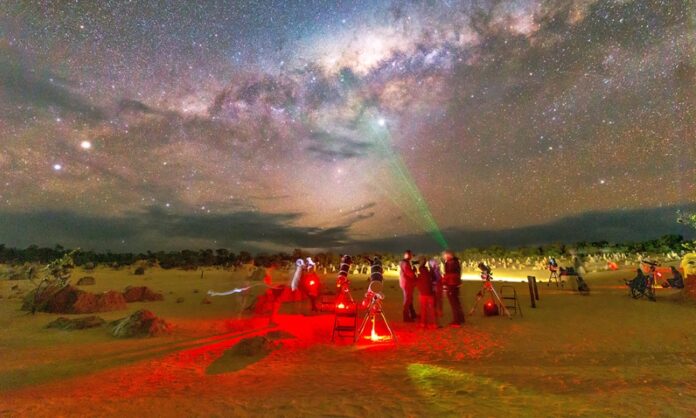A recent study by Batinoluho, L. (2024) titled “Exploring factors affecting astro-tourism development in Tanzania” published in JOURNAL OF TOURISM, CULINARY, AND ENTREPRENEURSHIP (JTCE), shows that Tanzania does not have tourist observatories or facilities with telescopes for Astro-tourism
Tanzania, known for its breathtaking landscapes and rich wildlife, is now emerging as a promising destination for astro-tourism. The unique combination of natural resources and an equatorial location offers a perfect setting for stargazing and other astronomical activities. This post delves into the potential of astro-tourism in Tanzania, the challenges it faces, its economic impact, and future directions for growth.
“
Tanzania lacks astro-tourism facilities and awareness but has significant potential due to its ideal conditions for stargazing and celestial events. -Batinoluho, L. 2024
Astro-Tourism Potential in Tanzania
Astro-tourism leverages the beauty of the night sky to attract tourists. Tanzania’s geographical position near the equator provides a distinct advantage, offering clear views of both the northern and southern celestial hemispheres. National parks and remote areas in Tanzania boast some of the darkest skies in the world, free from light pollution. This creates an ideal environment for stargazing, astrophotography, and astronomical research. Astro-tourism holds significant economic potential for Tanzania. By attracting a niche group of tourists interested in astronomy, Tanzania can diversify its tourism offerings and reduce its reliance on traditional wildlife tourism.
How the Study was Conducted
A sample of 196 respondents was selected from over 1912 tourism stakeholders. The author employed data through in-depth interviews (56 respondents), focus group discussions (74 respondents), and questionnaires (66 respondents). Focus groups included 8-10 participants each, from various backgrounds to ensure a diversity of perspectives. The author employed qualitative data from interviews and discussions that were transcribed and thematically analyzed, while quantitative data were processed using SPSS software.
What the Authors Found
The author found that Tanzania does not have tourist observatories or facilities with telescopes for astro-tourism and there is low awareness of astro-tourism among residents and domestic visitors, but inbound visitors show high interest. The author also found that no policy or legal framework exists for astro-tourism in Tanzania, and there is no specialized training for the discipline.
Why is this Important
Economic Impact: Developing astro-tourism in Tanzania could have a positive economic impact. It could contribute to the country’s GDP by attracting tourists interested in stargazing and celestial events. This revenue could support local communities and infrastructure development.
Untapped Potential: Tanzania’s equatorial location and natural resources make it an ideal destination for astro-tourism. By recognizing this potential, the country can tap into a niche market and differentiate itself from other tourist destinations.
Sustainable Tourism: Astro-tourism promotes sustainable practices. Unlike traditional wildlife tourism, it doesn’t disturb ecosystems or wildlife. It relies on existing natural resources (such as clear skies) and can be developed without harming the environment.
Educational Value: Astro-tourism provides educational opportunities. Visitors can learn about astronomy, constellations, and celestial phenomena. This knowledge can inspire interest in science and conservation.
What the Authors Recommend
- The author advocates establishing tourist observatories and facilities equipped with telescopes for stargazing. These facilities can attract both domestic and international visitors interested in celestial events.
- The author suggests that government should create a policy or legal framework specifically for astro-tourism. This will provide guidelines for sustainable development, environmental protection, and safety.
- Furthermore, the author recommends raising awareness among residents and domestic tourists about the benefits of Astro-tourism. Educational programs, workshops, and community engagement can help spread knowledge.
- In addition, the study posits that the government should develop specialized training programs for astro-tourism professionals. This will ensure high-quality experiences for visitors and enhance the overall industry.
In conclusion, Tanzania’s potential as a premier astro-tourism destination is immense. The country’s unique geographical advantages, coupled with its pristine natural environments, position it perfectly to attract a new wave of tourists eager to explore the wonders of the night sky. While challenges such as the lack of infrastructure, low awareness, and absence of regulatory frameworks currently hinder the development of astro-tourism, these can be overcome through strategic investments and policy initiatives. By establishing observatories, raising awareness, and providing specialized training, Tanzania can not only diversify its tourism sector but also promote sustainable practices and educational opportunities. Embracing astro-tourism offers a pathway to economic growth, community development, and environmental conservation, ultimately enhancing Tanzania’s global appeal as a diverse and innovative tourist destination.
















 The African Research (AR) Index is a comprehensive scholarly directory and database focused explicitly on journal publishers that publish and disseminate African research.
The African Research (AR) Index is a comprehensive scholarly directory and database focused explicitly on journal publishers that publish and disseminate African research.

